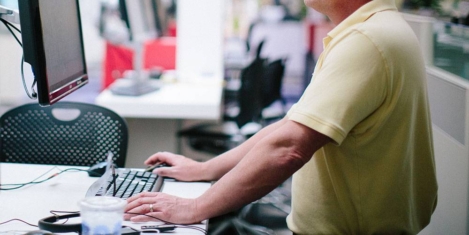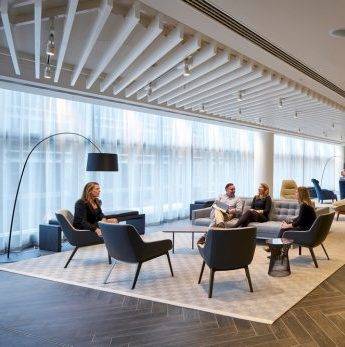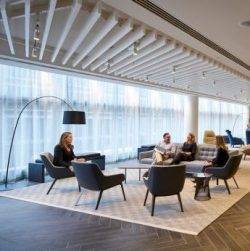To provide the best experiences, we use technologies like cookies to store and/or access device information. Consenting to these technologies will allow us to process data such as browsing behaviour or unique IDs on this site. Not consenting or withdrawing consent, may adversely affect certain features and functions.
The technical storage or access is strictly necessary for the legitimate purpose of enabling the use of a specific service explicitly requested by the subscriber or user, or for the sole purpose of carrying out the transmission of a communication over an electronic communications network.
The technical storage or access is necessary for the legitimate purpose of storing preferences that are not requested by the subscriber or user.
The technical storage or access that is used exclusively for statistical purposes.
The technical storage or access that is used exclusively for anonymous statistical purposes. Without a subpoena, voluntary compliance on the part of your Internet Service Provider, or additional records from a third party, information stored or retrieved for this purpose alone cannot usually be used to identify you.
The technical storage or access is required to create user profiles to send advertising, or to track the user on a website or across several websites for similar marketing purposes.
 The World Green Building Council (WorldGBC) has launched its new Net Zero Carbon Buildings Commitment as part of Building Lasting Change 2018 with WorldGBC Congress Canada in Toronto, and called on market leaders in the sector to join as signatories. The Net Zero Carbon Buildings Commitment challenges businesses and organisations across the world to take advanced climate action by setting ambitious targets to eliminate operational carbon emissions from their building portfolios by 2030 in order to meet the Paris Agreement ambition of below 2 degrees of global warming.
The World Green Building Council (WorldGBC) has launched its new Net Zero Carbon Buildings Commitment as part of Building Lasting Change 2018 with WorldGBC Congress Canada in Toronto, and called on market leaders in the sector to join as signatories. The Net Zero Carbon Buildings Commitment challenges businesses and organisations across the world to take advanced climate action by setting ambitious targets to eliminate operational carbon emissions from their building portfolios by 2030 in order to meet the Paris Agreement ambition of below 2 degrees of global warming.
















 Organisations with a strong people analytics culture are much more likely to report strong business performance claims new global research from the CIPD in association with Workday. However, the survey also highlights that the wide scale adoption of people analytics practice is still low and that more needs to be done to improve skills and confidence in the HR function, particularly in the UK which is lagging behind other markets in both capability and confidence. The research also highlights the importance of access to data. It found that access to people data improves outcomes but only 71 percent of HR professionals have access to this data, and just 42 percent of finance professionals do. For those with access to people data, just 22 percent use it daily in their decision-making and almost a quarter (23 percent) use it in decision-making just once a month or less. The research, People Analytics: driving business performance with people data, surveyed 3,852 business professionals globally – including HR and finance professionals – to understand attitudes towards people analytics and how it is being used in organisations.
Organisations with a strong people analytics culture are much more likely to report strong business performance claims new global research from the CIPD in association with Workday. However, the survey also highlights that the wide scale adoption of people analytics practice is still low and that more needs to be done to improve skills and confidence in the HR function, particularly in the UK which is lagging behind other markets in both capability and confidence. The research also highlights the importance of access to data. It found that access to people data improves outcomes but only 71 percent of HR professionals have access to this data, and just 42 percent of finance professionals do. For those with access to people data, just 22 percent use it daily in their decision-making and almost a quarter (23 percent) use it in decision-making just once a month or less. The research, People Analytics: driving business performance with people data, surveyed 3,852 business professionals globally – including HR and finance professionals – to understand attitudes towards people analytics and how it is being used in organisations.
 Almost half (49 percent) of companies are struggling to find skilled workers as digitisation and automation cause significant change in the skills businesses look for in professionals, according to new data from Robert Half UK. As a result, one fifth (21 percent) are now looking to recruit candidates with exceptional soft skills, with a view to developing the desired technical skills on the job. In the Robert Half research, UK business leaders consider an openness to new ideas (28 percent), an openness to change (26 percent) and good communication abilities (19 percent) as key attributes and will prioritise these areas when considering new talent. Digitisation and automation are rapidly evolving the business world. Companies are having to quickly adapt to the changing world of work, and are looking for employees who can keep pace,” says Matt Weston, UK Managing Director at Robert Half.
Almost half (49 percent) of companies are struggling to find skilled workers as digitisation and automation cause significant change in the skills businesses look for in professionals, according to new data from Robert Half UK. As a result, one fifth (21 percent) are now looking to recruit candidates with exceptional soft skills, with a view to developing the desired technical skills on the job. In the Robert Half research, UK business leaders consider an openness to new ideas (28 percent), an openness to change (26 percent) and good communication abilities (19 percent) as key attributes and will prioritise these areas when considering new talent. Digitisation and automation are rapidly evolving the business world. Companies are having to quickly adapt to the changing world of work, and are looking for employees who can keep pace,” says Matt Weston, UK Managing Director at Robert Half.




 A major research study “
A major research study “
 Business Secretary Greg Clark proposed new laws in Parliament yesterday (June 11th) that new large firms will have to justify their chief executives’ salaries and reveal the gap to their average UK worker. It means that for the first time, UK listed companies with more than 250 UK employees will have to disclose and explain this difference – known as ‘pay ratios’ – every year. However, according to data published today by the Chartered Management Institute (CMI) and
Business Secretary Greg Clark proposed new laws in Parliament yesterday (June 11th) that new large firms will have to justify their chief executives’ salaries and reveal the gap to their average UK worker. It means that for the first time, UK listed companies with more than 250 UK employees will have to disclose and explain this difference – known as ‘pay ratios’ – every year. However, according to data published today by the Chartered Management Institute (CMI) and 







